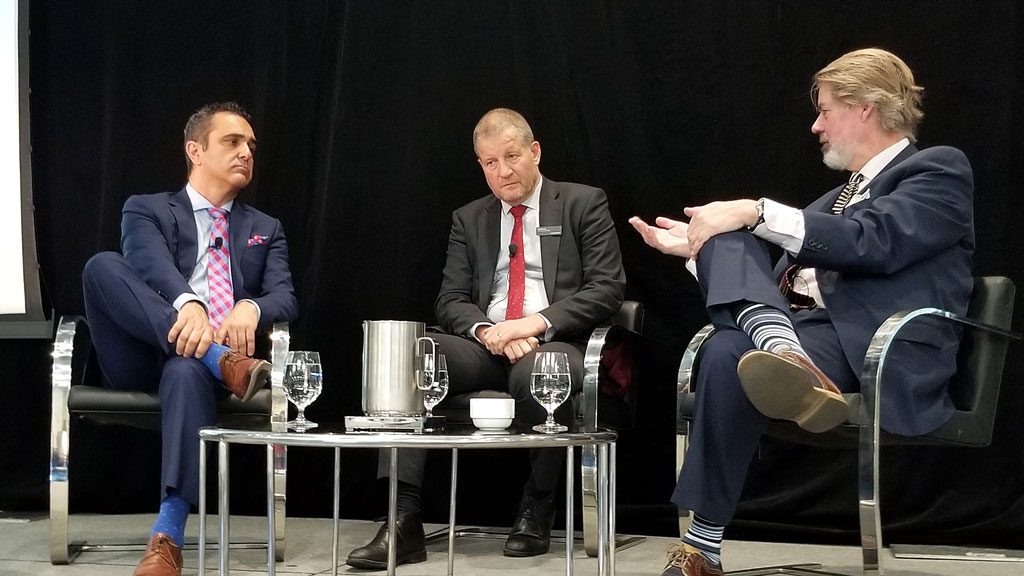In order to be truly successful, Metrolinx has to be a business, not a bureaucracy, said Phil Verster, CEO and president of the Crown transportation agency.
“I think Metrolinx may not be enough of a good owner. I think there is stuff we can do better and I think we need to understand each other a lot better in order to make sure we can deliver the program that is ahead of us in the next couple of years,” Verster told a room of industry executives in a candid talk during the annual CEO breakfast, which was hosted by ConstructConnect and the Toronto Construction Association during The Buildings Show in Toronto recently.
“I’ve been there for a year now and what’s been bugging me a lot is how fast can I get the organization to change. We still have a distance to go to get our organization and our culture and our way of looking into a place where we can be the owner I want us to be.”
Verster said he has learned a lot about working for organizations in different countries.
“When organizations aren’t very effective, it’s not because the people are bad, it’s because people like me or people like you, as CEOs, are not doing enough to give the organization the right direction it should have,” said Verster.
The forecasted program for transit in the Greater Golden Horseshoe is about $5 billion a year for the next 10 to 20 years, he noted, adding the construction industry is very important to the success, or failure, of the delivery of the program.
“What we need to get right though is, as an owner…this idea of standing on the sidelines with our arms folded waiting for the contractor to either succeed or fail is not going to bring us success,” he said, adding in contracts either both parties win or both parties lose.
In the last year, Metrolinx has improved the output in the construction part of its portfolio, he said.
“No matter which of the contracts or strategies we’ve got or procurement methods we follow, we need to lean in, we need to do what is necessary to get the contract to succeed, we need to find ways to align the objectives of the contractor with the objectives of our own organization and deliver on time,” Verster stated.
He also took the opportunity to speak to the construction community about safety.
“Some of the safety practices I see on our sites are not acceptable and it amazes me,” said Verster.
“It means that the organizations that employ these people are not focused on safety as much as they should be. My experience is that contractors that have good safety records are the same contractors that have really good material management, really good site management, really good control of their subs. When an organization is focused on getting things right around safety, they get a heck of a lot of other things right as well.”
Metrolinx will be starting to make safety a condition in the evaluation process for procurement in early 2019, he explained.
“It will become a really big criteria that will swing a contract award no matter what your price is,” said Verster. “Great contractors are great at safety and that is really key for us.”
He also said Metrolinx should be facilitating new stations getting built by the private sector.
The stations I want to build are stations where the developer invests in the station
— Phil Verster
Metrolinx
“This idea that Ontario can continue to spend its way into a transit future is not really sustainable,” Verster noted. “What we should do is we should harness the best of the economy, the best of the development initiatives, the best of the contracting community and have a different business model.”
New stations should incorporate residential and retail, he noted, referring to the new stations on the York-Spadina extension.
“They are lovely stations but there is nothing on top of them,” said Verster. “The stations I want to build are stations where the developer invests in the station, gets the benefits of the infrastructure that is built but in the process, builds me a station with a retail space underneath it. That’s the way other parts of the world do it. We haven’t done it and we will be doing it from now on.”
He concluded his talk discussing the ways Metrolinx can improve as an organization and an owner, starting with listening.
“We need to listen to you better,” Verster told attendees. “Have I listened to you well enough this year? I don’t think so. I am always open to listen and I welcome any one of you who want to talk to me.
“We all have skin in the game and when things go sideways is when we need to be able to talk to each other and trust each other. I am looking forward in the next couple of years to work with you as long as people can stomach me to do this job, because I’m not always in the same direction as everyone else. I like to do what I think is right.”
Metrolinx also needs to improve the way it issues tender information to the market, he said.
“If we don’t put tender information out well enough, the market struggles to tender, or you tender too high because there is too much uncertainty, or you think you understand what we want but we are not aligned,” explained Verster. “Now we’re not letting any tenders out if my team doesn’t put enough information. It’s necessary that we get better at this.”











Recent Comments
comments for this post are closed